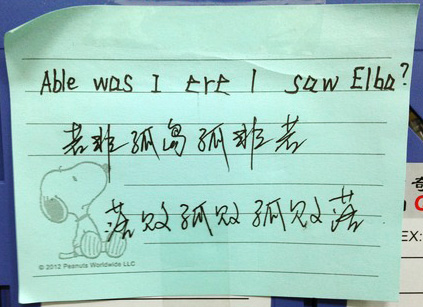Chinese Tuesdays: Palindromes

I've always been a fan of palindromes, but never expected to run into translations of Napolean's supposed quote "Able was I ere I saw Elba" as palindromes in Chinese.
The above note, written by a friend, gives two palindromic translations: 若非孤岛孤非若 (ruòfēigūdǎogūfēiruò), which translates word-for-word as "were it not for isolated island, lonely would not be"; and 落败孤岛孤败落 (luòbàigūdǎogūbàiluò), literally "leaving behind isolated island, loneliness declines". On the note I think the middle 败 (bài) is a mistake, as it should be 岛 (dǎo), island.
Amazingly, these are not the only possibilities. There is also 无能兮厄岛到,到岛厄兮能无 (wúnéngxīèdǎo, dàodǎoèxīnéngwú; "without possibility of arriving on distressed island, arriving on island would not distress"), which also works if you switch 无能 for 能无 and vice versa. And 不到俄岛我不倒 (bùdàoédǎowǒbùdǎo; "not suddenly reaching island, I wouldn't fail"), which is not an exact palindrome but a clever use of 到/倒 (dào/dǎo; arrive/fail) and 俄/我 (é/wǒ; suddenly/I).
Last but not least is 吾抢见能岛,能见强吾 (wúqiǎngjiànnéngdǎo, néngjiànqiǎngwú; "I rush to see the island, am compelled to see myself"). 抢 and 强 are different characters but both pronounced qiǎng. Don’t ask me quite how it or the others mean “Able was I ere I saw Elba” though.
•
A version of this Chinese Tuesdays post originally appeared on Sam Duncan's blog

















